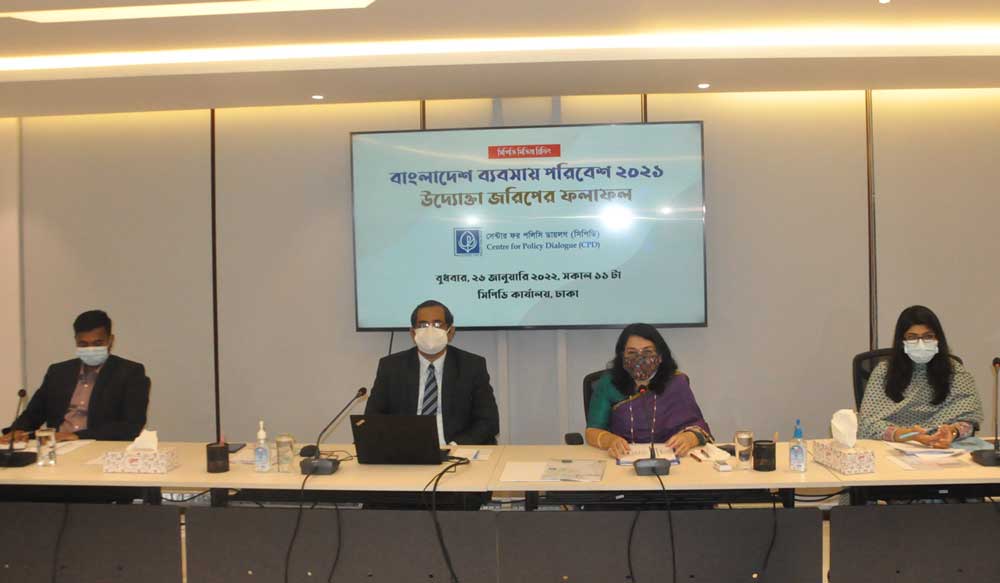
Corruption, weak and inefficient bureaucracy and limited access to credit – are the top three challenges which raise the cost of business significantly during 2021 particularly for the micro, small and cottage industries. A number of emerging concerns such as tax, health and skilled workforce related issues are also affecting all categories of businesses particularly large scale and FDI led investments. Drive against corruption particularly those which have adverse effect on businesses such as bribes in licensing, registration, providing utility facilities and tax collection should get the priority. Besides transparency and accountability of related public services should be put focus on. Most of the businesses took cost-cutting measures as survival and recovery strategy, and apprehended a minimum recovery period of 3 years. The period is rather long across all categories of enterprises (micro, small, medium and large). An inclusive recovery plan needs to be implemented focusing on reduction of tax rates, better access to credit facility and reduction of corruption.
These observations emerged at a media briefing on Bangladesh Business Environment 2021: Findings from Entrepreneurs’ Perception Survey, organised by the Centre for Policy Dialogue (CPD) on 26 January 2022. CPD presented the findings from the ‘Executive Opinion Survey (EOS)’, conducted during April-July, 2021.
While speaking at the media briefing, Dr Fahmida Khatun, Executive Director, CPD noted that the businesses are facing two challenges – how can the businesses overcome the pandemic crisis and reach to an even better situation than before, and coping up with the changing economic, geopolitical, technological and environmental risks in order to sustain its competitiveness. Usage of advanced technologies by entrepreneurs and ensuring administrative and good governance in the business sector are the major preparations that we need to take keeping LDC graduation in mind.
Dr Khondaker Golam Moazzem, Research Director, CPD made the keynote presentation. The competitiveness of the business environment in the post-COVID period has increasingly been defined from the perspective of ensuring equal access to opportunities, inclusivity, addressing inequality, improvement of physical, social and environmental conditions to create a more resilient economy in an effective and efficient way. Dr Moazzem presented that Bangladesh’s journey during the time of COVID disaster is appreciated; however, he questioned whether the journey could create a recovery path for businesses in all accounts. While the businesses in many accounts have signs of recovery, it is in most cases a disproportionate recovery which largely fails to ensure decent employment and wages, access for the marginalized, ensure social and environmental development. Businesses are still confronting structural challenges while new challenges are added to further questionable to competitiveness.
Restructuring of the fiscal incentives focusing on micro, small, self-employed and emerging businesses are highly essential – upcoming national budget should highlight these issues. Bangladesh needs to address various risks in next two years which would have disproportionate impact on different categories of businesses. Debt crises, illicit activities, geopoliticisation of strategic assets, climate action failures, human made environmental damage, employment and livelihood crisis and digital inequality – Bangladesh needs to consider those concerns along with its current and upcoming development policies and strategies.
Bangladesh needs to be cautious about digital inequality by ensuring easy access and low-cost facilities for all categories of people including marginalized, women, youth and SMEs etc. Necessary fiscal and budgetary support should be made available to expand the digital services across the board. DFS, Skill development, Data management, AI and etc are the future opportunities for businesses in Bangladesh. Investment is needed to develop better linkages with growth districts with major urban city points – both public investment and decentralisation are essential to reduce pressure on urban cities. Future investment should focus more on clean energy and green growth in industries, power and energy, agriculture, transport and other sectors. Competitive market is considered to be in place for doing business by all categories of businesses and enterprises. Government’s institutions such as Competition Commission needs to be proactive and capacitate to identify the problems of dominant market players and to ensure competitive behaviour.
Skill development is identified as a major area of private sector businesses in future. National Skill Development Authority (NSDA) should come forward to extend necessary support to the private sector in pursuing their businesses. Given the challenges of employment and income, unemployment insurance could be an area of business. Government should further extend its social Safety Net programme and should design the framework for unemployment insurance in the country. Opportunities for marginalized, disabled and other specialized groups need to be ensured and to be incentivized through fiscal and budgetary support. Business reporting of human and labour rights as well as environmental compliances and corporate practices need to be promoted. In this context, UN guiding principles such as UNGPs, UNGCs and ILO conventions and other human and environmental commitments need to be followed by the businesses.
The briefing was followed by a Q&A session with journalists from print and electronic media.


